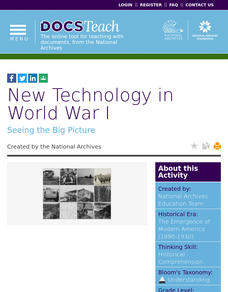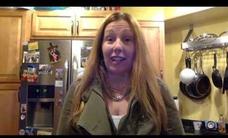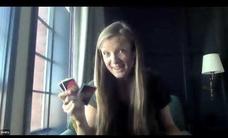Curated OER
The Mitten
Explore the Ukraine through a reading of The Mitten. Readers will determine the sequence of events, cause and effect, make predictions, and find the main idea of the story. They also use math skills to make charts and graphs. Finally,...
Curated OER
The Science of Lance Armstrong
Live Strong! High schoolers will discuss some of the reasons behind Lance Armstrong's success in cycling and chart those reasons into four categories: Physiology, Psychology, Equipment, Training/Strategy. They will then choose one sport...
Overcoming Obstacles
Using Appropriate Resources
A lesson plan dives deep into reference materials. The class begins with a discussion of which resources are best used for specific purposes and how to identify ways to get the needed information. Learners share information about the...
NASA
How Rockets Work
Now, that's some fire power! A five-page handout provides a description of the basics of how rockets work. The reading explains Newton's Laws of Motion by beginning with defining some of the important terms. The article finishes by...
NASA
Pop! Rocket Launcher
How do I build a launcher to launch paper rockets? A teacher reference provides directions in order to build a rocket launcher out of PVC pipe and a two-liter bottle. The plans also contain directions on how to use the launcher.
NASA
Heavy Lifting
Accept NASA's challenge to design heavy lifting vehicles. Groups of three design balloon-powered rockets to carry as much payload to the ceiling as possible. The teams are encouraged to launch several times while making improvements to...
NASA
3...2...1...Puff!
Which will make it fly better? Individuals build paper rockets with fins that are launched using straws. After determining an average flight distance, they make adjustments, such as size and location of fins, and try again. A second...
NASA
What Comes Next
Where is NASA going next with their rockets? A reading provides an overview of the next generation of rockets for space exploration. A full-page diagram gives the reader a scaled perspective of what this rocket may look like, for both...
NASA
A Pictorial History of Rockets
3, 2, 1: Blast off! Take a look at the history of rockets through a camera lens. A set of 41 cards displays more than 2,000 years of rockets, from their use as toys to space flight.
NASA
Rocket Races
And they are off! Using Styrofoam meat trays and balloons, individuals build racers that demonstrate Newton's Third Law of Motion. Pupils run their racers three times and make improvements between each trial. To conclude the activity,...
Health Smart Virginia
Socially Conscious Social Networking
A powerful, award-winning video launches a lesson about socially conscious social networking. After watching the video and engaging in a full class discussion, individuals share their ideas about healthy social networking in a podcast or...
DocsTeach
New Technology in World War I
A fast-paced activity focuses on the development of technology during World War I. Young historians match images of new technologies and complete a worksheet. Scholars also read an account of the war from the perspective of an American...
Health Smart Virginia
Be Smart with Smartphones (and Screens)
Would you rather have a broken phone or a broken bone? This very engaging question launches a discussion about the smart use of smartphones and screens. Young scholars watch a series of videos, complete worksheets, and engage in...
DiscoverE
At Home: Keep a Cube Activity
Let cooler heads prevail. Future engineers first learn about heat transfer and insulation. They then design and build a contraption that will prevent an ice cube from melting for as long as possible.
DiscoverE
Everyday Engineering: Foil Boats
Keep one's dream of becoming an engineer afloat. Learners apply the engineering design process to build a boat out of aluminum foil. They start with a square boat, then consider whether boats of different shapes would be able to hold...
DiscoverE
At Home: Safe Landing Activity
A parachute is probably a good idea. An engaging lesson has pupils brainstorm ways to slow the descent of a falling object to minimize the impact when it lands. They decide on a design, build a prototype, test it out, and then make...
DiscoverE
Everyday Engineering: Windy City Tower
A little wind shouldn't hurt a building. Given three sheets of paper and six feet of tape, scholars create a structure that can withstand wind and hold up a weight. They conduct tests using a fan and decide on any improvements to make...
DiscoverE
Everyday Engineering: Tennis, Anyone?
Take a swing at a fun activity. Pupils first watch a video that introduces the concept of elasticity in association with tennis rackets. They then design their own rackets and build them out of available materials.
DiscoverE
Everyday Engineering: Build an Earthquake Resistant Structure
Shake, rattle, and learn! Future engineers build structures out of toothpicks or spaghetti sticks, using marshmallows as connectors. They then use a homemade shake table to test the sturdiness of their creations.
DiscoverE
Everyday Engineering: Water Pollution Clean Up
Water, water, everywhere, but pollution is a major problem. Scholars design a filtration device or process that removes dirt and other particles from water. They use various household objects such as marbles, cotton balls, or coffee...
DiscoverE
DiscoverE Challenge: Pen Factory
Manufacture a great lesson on industrial manufacturing. A fun resource has learners use the production of pens to consider how assembly lines work. They write out a set of instructions for assembling a pen, test it out, then determine if...
DiscoverE
DiscoverE Challenge: Tallest Cup Tower
Dream big and build tall. Scholars build the tallest tower possible out of plastic or paper cups. They apply the engineering design process to refine their designs and see if they can make their towers even taller.
DiscoverE
DiscoverE Challenge: Critical Load
Take a load off .. and put the weight on a house of cards. Scholars learn about civil engineering and critical loads by building the sturdiest house possible out of a dozen playing cards. They conduct tests by placing pennies or other...
DiscoverE
Everyday Engineering: Colorful Chemistry
Watch red cabbage juice turn green. Pupils first watch a video that takes them through the process of creating red cabbage juice. They then add various solids and liquids to the juice and use the color change to determine whether the...

























